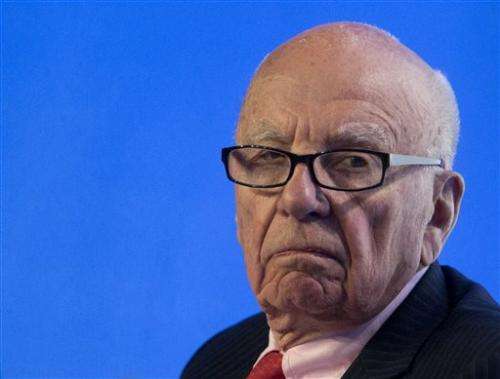21st Century Fox abandons pursuit of Time Warner

Rupert Murdoch's 21st Century Fox is abandoning its attempt to take over Time Warner in a proposed deal that would have combined two of the world's biggest media companies.
The about-face announced Tuesday comes three weeks after Time Warner Inc. revealed that it had rejected 21st Century Fox's unsolicited $76 billion buyout offer.
There had been hopes that 21st Century Fox, which owns the 20th Century Fox movie studio, Fox broadcast network, and TV channels Fox News and FX, might raise its original cash-and-stock offer bid of roughly $86 per share to as much as $100 per share to win over Time Warner. Even with 21st Century Fox now out of the picture, Time Warner's shares still remain above where they were before the news of buyout offer came out.
New York-based Time Warner, which owns the Warner Bros. movie studio and TV channels such as TNT, TBS and HBO, didn't immediately respond to requests for comment about 21st Century Fox's decision.
Many analysts had expected Murdoch to continue stalking Time Warner after the initial cold shoulder, reasoning the billionaire viewed a takeover as a prime opportunity to create a movie and television powerhouse that would be in a better bargaining position to sell its video content at a time when video distributors are muscling up too. Comcast Corp., the largest cable and high-speed Internet provider, is trying to win approval to buy rival Time Warner Cable while AT&T Corp. is trying to gobble up satellite TV service DirecTV.
As in the case with those proposed deals, 21st Century Fox would have had to navigate potentially daunting antitrust hurdles to buy Time Warner. Cultural clashes also loomed had the two companies combined, a factor that turned Time Warner's merger with AOL Inc. in 2001 into a monumental flop. Time Warner and AOL eventually split, but not before costing their shareholders tens of billions of dollars.
With the proposed Time Warner deal off the table, 21st Century Fox's board approved a plan to spend $6 billion on buying back stock.
Murdoch cited a decline in the New York company's stock price since the takeover bid was announced as one of the reasons for the change of heart. Fox's shares have dropped 11 percent. They rose $2.50, or 8 percent, to $33.80 in after-hours trading Tuesday.
Meanwhile, investors betting that Murdoch was going to sweeten his offer bailed out of Time Warner. Its stock fell $8.19, or 9.6 percent, to $85.19 in extended trading.
This isn't the first time that Murdoch has walked away from a deal that he once seemed to prize. In 2008, he gave up on buying DirecTV in 2008 through another company, News Corp., after Liberty Media Corp. chairman John Malone outmaneuvered him. He also withdrew a bid to boost News Corp.'s stake in British Sky Broadcasting Group PLC in 2011 amid outrage over a phone hacking scandal at News Corp.'s British newspapers.
Murdoch's News Corp. split into two companies last year: The newspaper and publishing portion, still called News Corp., and the film-and-TV unit, 21st Century Fox Inc.
© 2014 The Associated Press. All rights reserved.

















